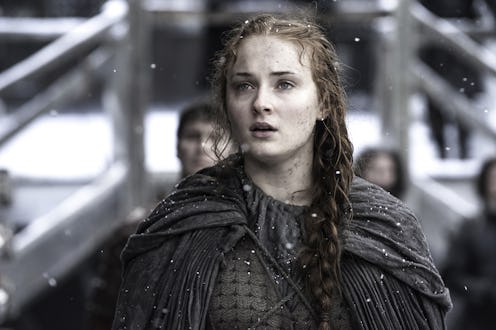
I think it's fair to say that, to most people, 2016 was something of a mixed bag. There were, of course, plenty of undeniable highs, but also, sadly, many excruciating lows. So as the clock winds down on this calendar year, it's time to look back at the things that made us happy over the past 12 months and remember the joy they brought us — like the unexpected sight of two long-separated Stark siblings finally reuniting. Yes, television brought us many new pleasures this year (Stranger Things, Westworld, Insecure, The Crown), but it was one of the medium's long-running fan-favorite shows that had the most joyous moment of the season… which is just one of the reasons why 2016 was the year of Sansa Stark.
That statement comes as even more of a surprise considering the chilly reception fans had to the character's storyline just one year ago. After four seasons of steady growth and maturity, the show slipped Sansa back into her old role of the default victim. She suffered untold abuses and humiliations at the hands of her arranged husband, Ramsay Bolton — including an infamous rape scene that became a lightning rod for conversation around Game Of Thrones ' portrayal of sexual violence.
But the writers apparently learned from their Season 5 missteps, as Season 6 quickly fulfilled the promise made at the end of Season 4 when Sansa descended that staircase with her gothic makeover and her ready-to-take-over-the-world attitude. Finally freed from Ramsay's clutches, the character was able to fully realize her potential and capitalize on the well-structured arc that showrunners David Benioff and D.B. Weiss had laid out for her in the show's first four seasons.
In only seven episodes (Sansa didn't appear in three of Season 6's 10 chapters), the eldest Stark daughter had several of the most dramatically satisfying moments out of the entire sprawling cast of Game Of Thrones. She proved herself not just a capable leader in the present — leading the tour of the great lords of the North and marshaling the forces of the Vale — but also that she had a mature awareness of the mistakes in her past, both her own (apologizing to Jon for the way she treated him when they were children) and others' (taking Littlefinger to task for his role in selling her off to Ramsay).
And, of course, Sansa got the satisfaction of feeding her abuser to his own starving dogs in one of the season's most cathartic scenes.
To be fair, plenty of other female characters got their own shining moments in what was arguably Game Of Thrones' most feminist season yet: Arya finally taking vengeance for the Red Wedding, Yara forming an alliance against her tyrannical uncle, Cersei laying waste to her enemies, and Daenerys literally burning the patriarchy to the ground. But there's something that sets Sansa Stark's journey apart from the rest.
Perhaps it's the fact that she started as arguably the most naïve character on the entire show, making her arc all the more satisfying. Or perhaps it's because of her young age, which has allowed us to watch her development in full rather than from a certain point in her life, like Cersei Lannister. (As the only female character younger than Sansa, Arya's evolution from plucky spitfire into cold-blooded assassin has gradually become less gratifying than it is worrisome.)
Cersei's and Dany's triumphant stories are still important to tell, but the character whose story feels the most timely — and the most important — is undoubtedly Sansa. She's a young woman who has had to grow up learning how to survive in a world dominated by men. A young woman who, for every her victory and sign of progress, has had to face yet another obstacle or relapse back into a subservient position. After the election, and Hillary Clinton's loss to Donald Trump in the race for president, Sansa's journey feels more relatable than ever.
In Season 6, Sansa learned to rely on her own instincts and abilities, and those of other women — like Brienne (who helped rescue her from Ramsay's forces) and Lyanna Mormont (who proved herself one of House Stark's most loyal subjects) — rather than the men around her, even ones who purported to be allies — like Littlefinger (who claimed to love her while only ever using her for his own purposes) and even Jon Snow (who had to be talked into reclaiming his own castle by his younger half-sister).
Sansa may not sailing through the air on the back of a fire-breathing dragon. She may not be adopting magical face-changing disguises to assassinate her enemies. She may not be sitting on the Iron Throne. (At least, not yet.) She's just a woman who has gotten very good at surviving in a world that is structured to deny her any sort of power or agency. She hasn't allowed her struggles to make her abandon her moral compass, like Arya, or to render her entitled, like Dany, or bitter, like Cersei. After everything she's been through and all the indignities and atrocities she's survived, Sansa remains miraculously determined, intelligent, and loyal.
Ideally, Sansa shouldn't have to live her life constantly calculating how to navigate through the formidable roadblocks of the patriarchy, and maybe someday she won't have to. But, in the meantime, she remains an expert at it out of necessity. However, she's also someone determined to fight against it, and someone who hasn't allowed the struggle to defeat her, no matter how seemingly hopeless it may get. That's what made her the most relatable character on TV this year… and it's why 2016 was absolutely the year of Sansa.
Images: Helen Sloan/HBO (5)